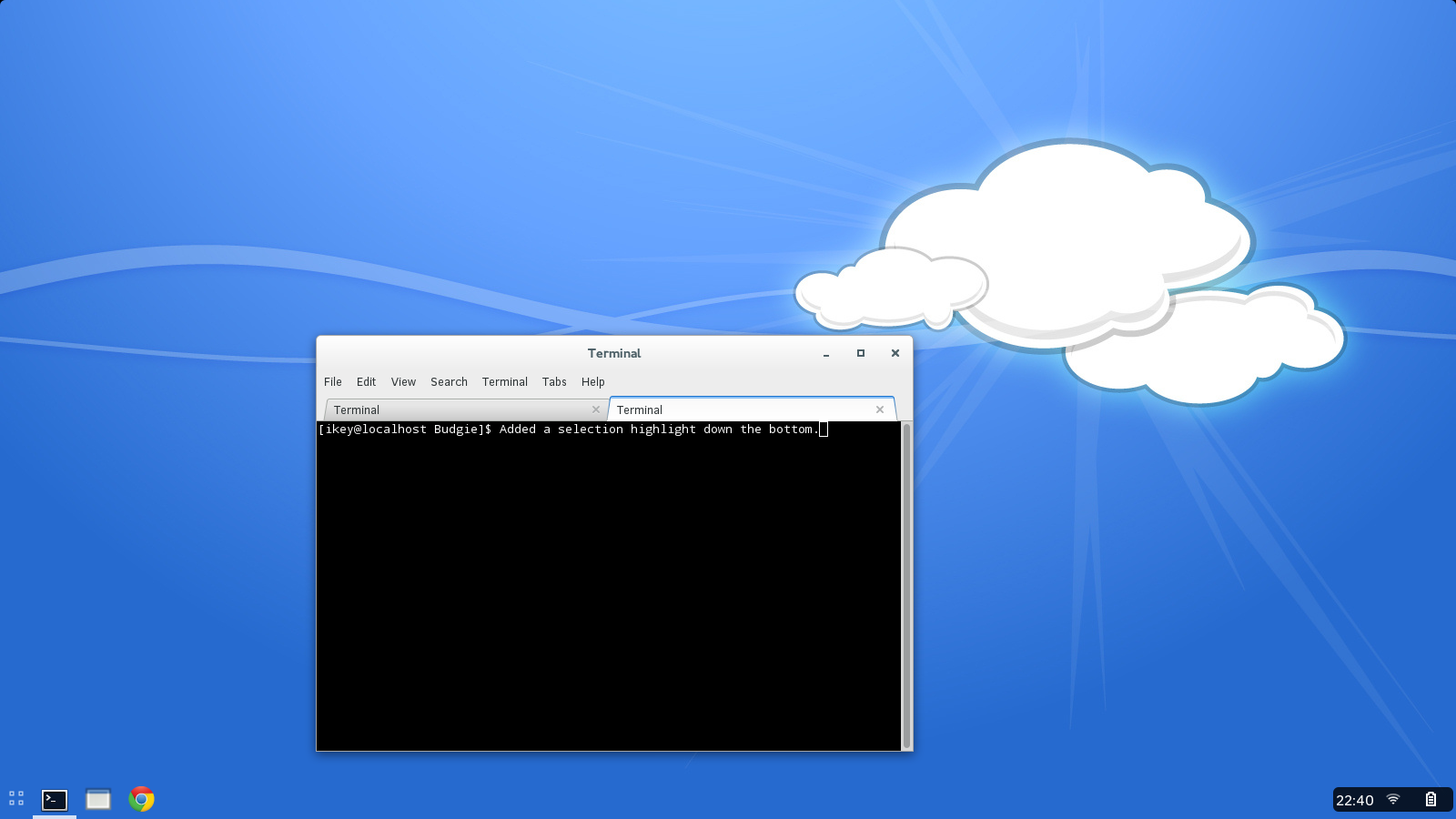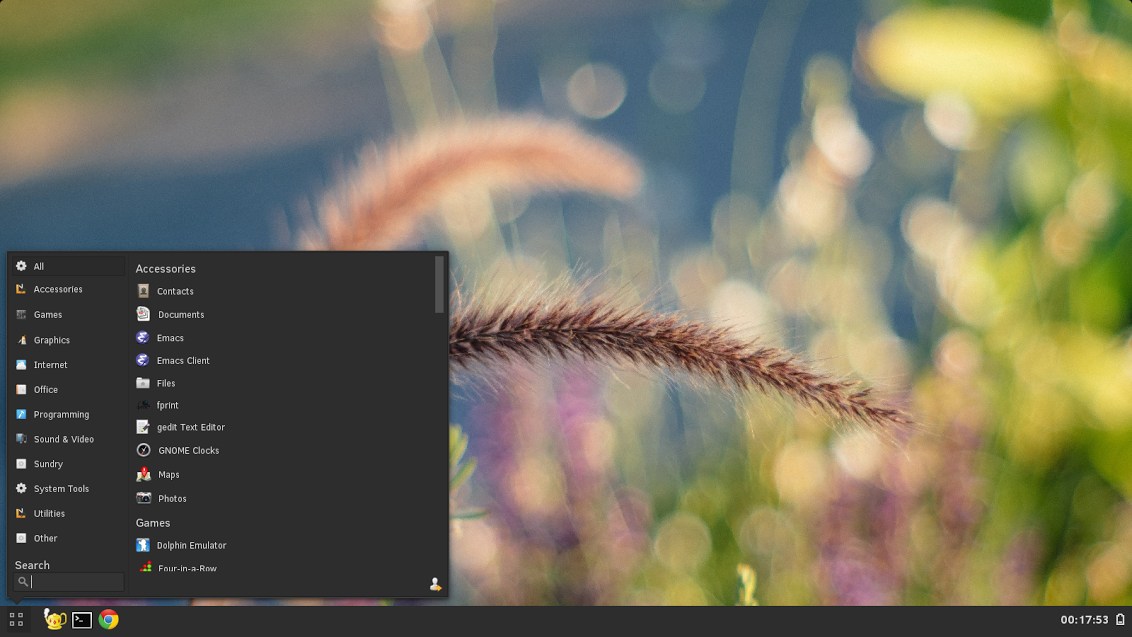
Evolve OS - an Upcoming Linux Distribution Featuring a New Desktop Environment
By Andrew Powell, published 18/02/2014 in Upcoming
Evolve OS is a new upcoming Linux distribution based on openSUSE and sporting a new desktop environment based on the Gnome 3 stack. You may immediately be thinking, is this yet another 'Ubuntu Killer' promising a lot and ultimately delivering little? But Evolve OS has a different philosophy and some interesting ideas. Read on to find out more.
Evolve OS is a fairly young project created by software engineer, Ikey Doherty. If that name seems familiar, it's probably because it is. Ikey was the creator and lead developer of SolusOS, a beginner-friendly Linux distribution based on Debian Stable but incorporating many updated applications via Debian Backports as well as features such as a first-run wizard that took care of installation of non-free graphics drivers. It also featured third party codecs and plugins such as Adobe Flash included out of the box.
SolusOS proved to be quite popular, especially among those users who appreciated it's Gnome 2 interface amidst the emergence of the new Gnome 3 or those who simply wanted an easy to use everyday Linux distribution that was closer to pure Debian. Sadly, however, during development of the new SolusOS 2 the project was abandoned due to a lack of manpower, especially as the new version was reported to be using a new desktop called Consort (a forked version of Gnome 3 Fallback Mode) and the distribution itself was becoming a more independant entity rather than purely a Debian derivative. A load that ultimately proved to be far too much for essentially a one-man team.
In recent months however, Ikey has entered the Linux distribution game again, this time with a somewhat different direction and likely having learned from his experience with SolusOS, some different and very interesting development philosophies.
Please Note: The software that is the subject of this article is still in heavy development and may change in various ways from what is described.
Enter Evolve OS
The project's About page first describes Evolve OS as a Linux distribution "that intends to be both modern and traditional at the same time, easing the transition for new users from other operating systems, or indeed other Linux distributions", which may at first sound very much like many other new Linux distributions that come along, but further reading down the page reveals much more of the project's intentions:
Quote:
Most projects focus on common buzzwords, such as ‘modern, lightweight and userfriendly’. However, after extensive experience (several years) in the development of Linux distributions, those are buzzwords that are avoided here.
Development Philosophy:
- Creation of dependent technology: Any technology created for the project will always be based on or integrated with another technology, allowing integration into other projects.
- Avoid forks. Forking is part of the beauty of free software, however it should always be considered as the very last possibility. An example of this is our desktop environment, which is both a dependent technology and avoids the need for a fork, by leveraging the GNOME 3 stack.
- Scope. This is incredibly important; no technology will be created that cannot be used or maintained by other projects. Our technology and projects must work with minimal modification in other environments.
- Upstream is important. This covers most of the points above, allowing the project to contribute any specific changes possible by smaller projects into larger upstream projects for use by everyone.
- Minimal technical debt. It makes no sense for a smaller project to carry technical debt throughout its life time. By encompassing all of the above points, we can eventually move most work into an upstream state, or at least work with various projects to maintain the technology for the benefit of all, relieving any strain on the project.
Evolve OS Aims:
- Provide a modern, yet traditional, desktop environment based on the GNOME 3 stack. This means using modern technologies and features commonly found in most computers to provide a stable transition area for new users.
- Investigate and develop new technologies/methods with an upstream focus. As a small project, we have the luxury of being able to deviate slightly from upstream projects to try out new technologies, and eventually contribute them back upstream if they work.
- User enabling: It is important that the user can focus on their tasks and daily work flow with no restriction from the operating system. This covers everything from multimedia capabilities, all the way up to preview features in the Linux kernel and even the installation of vendor drivers for graphics cards.
- Open Source, Open Spirit. Evolve OS is entirely open source, with the exception of some firmware blobs and codecs outside of the realm of open source software. With that in mind, the actions of the project should be representative of the open source world, allowing contributions from all sectors, and exposing our infrastructure, methods and source code.
- Stability is king. For any user, one of the most important aspects of a good operating system, is that it works after every update and reboot. Evolve OS will leverage existing upstream technology to ensure stability, whilst providing up to date user-land applications.
- User-land matters. If you’re a Firefox user, or even a VLC user, its important that these applications are kept up to date, whilst maintaining stability and security. Evolve OS provides a stable base with up to date applications, for your enjoyment.
As we can see, Evolve OS has a strong focus on avoiding forks and keeping as close to upstream as possible, to relieve strain on the project of having to maintain it's own forks of different pieces of software with the added benefit of increasing contributions to those upstream projects, with the aim of benefiting all those involved.
To better explain the project's goals, Ikey Doherty wrote in a blog post titled 'Clarification', that both Evolve OS and the Budgie Desktop "exist solely for experimentation, with the purpose of discovering/developing new techniques and ideas with the aim of upstream integration in larger projects, such as openSUSE, GNOME, etc."
Ikey describes it as being like an oven, "where new ideas can be baked to be shared with other projects". But at the same time, Evolve OS is intended to be a fully usable and stable distro where new ideas and ways of interacting with the desktop can be experimented upon and tried out, by anyone that is interested and willing.
Speaking of the desktop...
The "Budgie Desktop", mentioned above, is Evolve OS' desktop environment, a custom desktop shell based on Gnome 3.

The Budgie Desktop; it sports a Chrome OS feel about it. Image Credit: evolve-os.com
Of course, it must be stressed that the desktop is not a fork of Gnome 3/Gnome-Shell. With Evolve OS' goals in mind of avoiding forks and using and integrating with as much existing technology as possible, Budgie Desktop merely consists of a custom window manager called budgie-wm (a wrapper around libmutter), a panel called budgie-panel (currently a Chrome OS inspired transparent style in it's current incarnation, but third-party plugin support and themes are planned) and budgie-session which according to Ikey, simply launches gnome-settings-daemon and the aforementioned panel and window manager, therefore providing all the basic components for the desktop environment.
Everything else leverages the Gnome 3 stack underneath.
At the moment, the desktop is still in an evolving stage (see what I did there?) so much could still change, but it's obvious the first incarnations of Budgie Desktop are designed to be simple and easy to use while still being attractive. As it is indeed seemingly so simple, there's not much else to be said about the desktop, especially as if you're familiar with Gnome 3 and the Mutter window manager (budgie-wm uses libmutter, so the desktop/window effects etc. will remind one much of Gnome-Shell or Cinnamon effects), the Budgie Desktop will likely seem quite familiar to you, but with some new ideas and concepts intended to come.

Another look of the Budgie Desktop, demonstrating basic theming ability. Image Credit: Ikey Doherty's Google+ Post
Nevertheless, Ikey recently did a short video demonstrating the Budgie Desktop in actual use, if you wish to see more. More screenshots can be seen from that same link also, on Ikey's Google+ profile.
Where to from here?
Evolve OS is still in development, so it's not yet ready for public consumption nor is there a complete pre-packaged ISO that one could download.
However, if you're keen and willing to help with any potential bugs or just want to have a bit of fun, you can test out the Budgie Desktop. As Evolve OS is directly derived from openSUSE 13.1 (again, not forked) and due to the stage of development, you can install the latest version of Budgie Desktop with that version of openSUSE and get pretty much the same result of the full OS.
For openSUSE 13.1 and even Fedora 20, instructions on how to obtain Budgie Desktop can be found on evolve-os.com. Or if you're really adventurous, you can go directly to the project's GitHub.
As always though, do bear in mind that with development or alpha software, it may well break, smash or Falcon punch your Linux installation and kill your cat. Okay, your cat may be safe, but I'm sure the warning has been heeded!
Evolve OS along with it's Budgie Desktop looks to be shaping up to be something very interesting and very community/sharing orientated - very much in the spirit of open-source - and could provide a powerful and flexible testbed for change on desktop Linux. Obviously there's a long way to go yet, but that's why, if you're interested, by all means help out! Testing software, reporting bugs or even just suggesting graphical design ideas etc., it all helps.
We will follow the developments on Evolve OS closely, so stay tuned on The Linux Rain for updates and potentially even hands-on previews of the software as it progresses.
You can subscribe to our RSS feed, follow us on Twitter or find us on Google+.